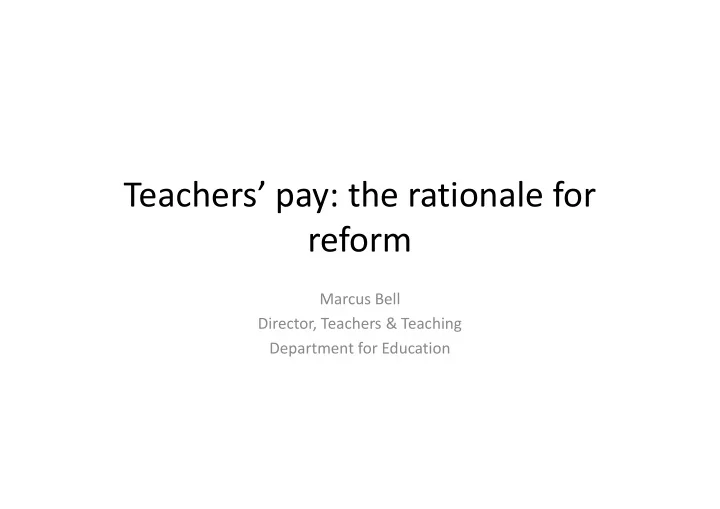

Teachers’ pay: the rationale for reform reform Marcus Bell Director, Teachers & Teaching Department for Education
Overview • The old system • What was wrong with it • Ministers’ perspective • The new system • The new system • Some myth-busting • What does the future hold?
The old system National system of pay and conditions for all maintained schools • Four regional pay bands; Inner London, Outer London, London Fringe, Rest of • England and Wales Four pay-scales or ranges for classroom teachers; main pay scale, upper pay • scale, advanced skills teacher pay range and excellent teacher pay range System of 10 allowances, the main ones being Teaching and Learning • Responsibility (TLR) payments and SEN allowances Near automatic annual progression on the main pay scale, national criteria for • access to the upper pay scale, biennial progression on the upper pay scale Salary attached to a teacher not a post, so a teacher moving schools has a • guarantee of the same base salary in their new school
What was wrong with it? 1. Little correlation between teachers’ pay and local labour market conditions 2. Pay by seniority/length of service, not performance performance 3. Not enough scope for schools to reward the highest performing staff 4. Automatic progression a poor use of public money in a time of austerity
National pay is unfair – teachers’ pay compared to private sector graduate pay
Pay by seniority? – Teachers’ pay by age
The only way is up – distribution of full-time qualified teachers on the main and upper pay scales
Ministers’ perspective • Teacher quality matters more than anything else • Schools should have more freedom • Labour markets work in other sectors, why not in teaching? • What about academies? • Whitehall climate around “local pay” • Timing and the state of the economy
The new system • Removal of all statutory spine points on the classroom teacher pay scales • Removal of automatic pay progression, all progression to be justified by performance • Removal of pay portability – schools no longer obligated when appointing to match a teacher’s salary at their previous school • Advanced Skills Teacher and Excellent Teacher pay-scales abolished, replaced by Leading Practitioner pay scale with less specific criteria attached • Simpler criteria for progression to the Upper Pay Scale
Some myth-busting New arrangements aren’t “payment by results”. Schools decide what • good performance is and how they want to reward it, not Government Schools decide how far and how fast they want to change their • approach to pay Deregulation doesn’t mean a “race to the bottom”. In Sweden, • teachers’ pay differentials narrowed You can’t cut teachers’ pay! •
What does the future hold? Some schools will make radical changes to pay and reward but many • won’t - at least not this year Pace of change will be driven by: • Local decisions • Experiences of “early adopters” • Headroom in school budgets • Speed of recovery of graduate labour market • Regional economic differences and how quickly they widen •
Recommend
More recommend